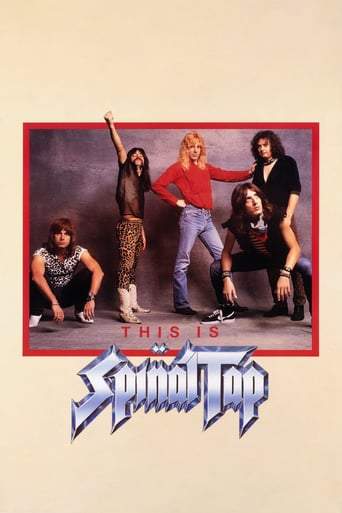johnlehmann
Rob Reiner and Christopher Guest made a classic, helping to define the 'mockumentary' genre with incredible characters and endless memorable lines. Loved it!
Osmosis Iron
The greatest mockumentary ever! The best satirical take on the whole Rock N' Roll lifestyle. Chronicles the US tour of the "world's loudest band" Spinal Tap. During the tour everything that can go wrong will go wrong. The band, it's members and songs are absolutely hilarious. So many funny and memorable scenes and quotes it's pointless to name the best ones. This one goes up to eleven!
ElMaruecan82
"Why don't you just make 10 louder, and make 10 be the top number, and make that a little louder?" I was so entranced by Nigel's enthusiastic description of his unique amplifier-model-that-goes-to-eleven that I almost failed to grasp the common sense in Marty Di Bergi's question. It's not about the number indeed but the acoustic referential to determine the degrees of loudness. But how can you teach such a flatly simple notion to someone who doesn't even let you point at the most precious item of his guitar collection.But it's subtler than that, the joke isn't at Nigel's obliviousness but at the fact that his reaction doesn't come as a surprise, Marty's question is almost funnier in the way it makes us expect "something". And boy does it reward our expectations, Nigel doesn't even answer, he stops chewing his gum, marks a solemn pause and provides the iconic, laconic and self-sufficient "these go to eleven". Both scenes and quotes became staples of 80's comedy summing up what makes Rob Reiner's directorial debut "This is Spinal Tap" one of the all-time greatest comedies: it knows its subject and what's more, it knows the right attitude to 'amplify' the comedic effects (to eleven and beyond).Everyone knows this is a film about a fictional rock band; the word 'fake' would be too misleading and even insulting. Spinal Tap might not belong to Rock'n'Roll canon, among the Beatles or the Rolling Stones but it's got something to say about rock, as a music, a spirit and a business. In fact, you might learn even more stuff about from this band than any documentary about a real group. And if I had to choose between learning with laughs or without, I'd rather have laughs. Who wouldn't? That's what makes the "eleven" scene so hilarious. Apart from the pedagogical value on the field of amplifiers, the way Christopher Guest delivers the quotes with that deadpan expression turns a rather banal quote into a punch-line of comedic genius. And all the movie works with the same mechanisms, David St Hubbins (Christopher McKean) and Derek Smalls (Harry Shearer) are totally oblivious to the hilarity of their statements, all delivered in the most casual way.That first scene alone is one of the highest summits of comedy and sets the tone of zaniness that will structure all the gags, from their first name "The Originals" to the first drummer (played by Ed Begley Jr.) who died in a freak accident, in fact every single drummer's accident is a try-not-to-laugh challenge where I fail every time. But again, it's not just the writing, mostly improvised, but also the acting, the documentary-like shooting allows many abrupt cuts and swiftly eluded moments where one couldn't keep a straight face.Watching the band telling these anecdotes about a drummer choking in someone else's vomit ("which police can't dust off") or one that exploded suddenly is funny enough, but the face of Reiner repeatedly nodding as if it was really serious is the key to the film's enjoyment. And most of the gags involved the craziest situations where they all try to keep a straight face, Smalls being locked in a cocoon, the group lost backstage, and some verbal delights involving a sexist disc cover… not to mention terrific cameos that include Fran Dresher, Bruno Kirby and Anjelica Huston.And the film never forgets to rock as a doc as well, it follows all the details of a tour organization and the struggle of the manager played by Tony Hendra, to book a concert, a hotel suite, or deal with matters of size from bread that is too small for the ham or a Stonehedge replica risking to be crushed by two gig-dancing dwarfs (paraphrasing David). You have a gag that works in a tertiary tempo, the set-up when you know there's going to be trouble. Then you have the musical interlude where you wait for the majestic entrance of the replica and the reactions of the band (who didn't know). The film even provides a little icing on the cake with St Hubbins' final comment.So, it might be improvised, but there's a sense of timing as acute and inspired as if it was used for music. The best compliment one can make to the film is that these guys are as good as musicians as they're comedians. And as far as I'm concerned, their music is credible enough to make the film feel real. And what makes the authenticity so palpable lies on these subtleties you notice after several viewings. The most delightful aspect involves the homoerotic subtext between Nigel and David (let's face It, Smalls is only slightly more famous than the drummers) and when Nigel's girlfriend comes in the picture, there's just something fading in Nigel it's actually touching."This is Spinal Tap" recreates the documentary feeling without resorting to cheap laughs. Near the end, there's even a sort of bittersweet feeling as their path comes to its logical conclusion, this might explain why many artists like Ozzie Osborne didn't actually laugh at it, that's how accurate it was. And the miracle of this film is to have provided powerful insights about rock business through a lousy and fictional band. But the film aged so well that no one would even use these adjectives to Spinal Tap, and rightfully so.And that concludes my 1111th review for IMDb, seriously, what other film would have I picked for this occasion? And while you're here, you might check one of the polls I suggested a few years ago about four-word movie quotes, guess which movie took the 11th spot? Yeah, that's right!
sharky_55
Film-maker Marty DeBergi has assigned himself a mission to investigate the inner lives of the rock band Spinal Tap, who he is drawn to not because of their lyrical poetry or their composition but because they can lay claim to being one of the loudest bands in Britain. Marty is played by Rob Reiner himself and is the crucial building block of his debut mockumentary. He wields his camera with sincerity, honesty and authenticity, and seems to hold the same qualities in his face, letting the inevitable mayhem of the band happen before his eyes. Reiner is a great comedic actor; he knows when to nod politely, and when to feign modest interest (almost always), and throughout the entire journey does not ever relinquish his poker face even slightly. His seriousness lends legitimacy to his capturing of the rogue band, and makes it all the more funny when they break from convention.The genius of the film is in how little effort Marty has put to in to get any decent material for his documentary. He points the camera, offers a few probing questions, and Spinal Tap do the rest. Through the simple verite style presentation there is the suggestion of a wilder, greater life that these musicians occupy off the screen, and how lucky for Marty to be able to capture even a little insight. They are larger than life itself, and even in the mundane they pop. Some of the humour comes from Reiner simply extending the documentary's boundaries, and pretending as if this was a completely normal venture. Marty asks, very solemnly, if the current Spinal Tap drummer Mick Shrimpton is afraid of the unfortunate fate of all the previous drummers, and Mick replies in turn, with all seriousness, that it was a legitimate issue that was discussed between them, as if he was talking about a missing tom- tom. Oh, and he's in the bathtub. Reiner also draws from another rather famous British band, in both style and content, and in a way that immediately produces contrast. A Hard Day's Night was one of the early mockumentaries that birthed an entire genre, and crafted a whole set of rules and guidelines from which concert films were to be made. They are all noticeably here, and Reiner freely exaggerates: the push-ins to the band's orgasmic expressions, the reaction shots of the (less than) ecstatic audience, the way the camera hurtles through backstage trying desperately to keep up with the mania of the crew. When Tufnel storms off in disgust after a particularly terrible show, see how we are immediately chasing after him, the frame bouncing with each step, and pausing for the full gravitas of the ugly stare-down. Who is causing the rift in Spinal Tap? None other than the Yoko Ono of their time, an earth- loving hippie who increasingly pushes her unwanted presence into the band's affairs. But Spinal Tap have been there and done that - their early, drug-fuelled hit (Listen To The) Flower People must be as flabbergasting as Lennon's I Am The Walrus. McKean, Guest and the rest of Spinal Tap are wild in the best way, given free reign to go haywire. They tap into a very specific and familiar persona of the rock star and all the glamorous, egocentric pretensions that come along with their music, and all the drama, backlash and toxic infighting that brings about their inevitable downfall (and comeback tour). All this, as the laws dictate, must be well publicised, and Reiner observes ever so diligently. The band is pompous, fired up from their brief success and thinking that no artistic boundary is beyond them. They hastily deflect any accusations or criticisms because such things are below their level. The critics may have been right - the White Album did have nothing on its cover, but even that is not so absurd as the excessively graphic content of Smell the Glove. Their other albums have similarly humorous titles. Some are simply two phrases stuck together - Shark Sandwich, Robotic Armchair, Cerebral Badger. You get the idea.They think themselves poets, and resort to more and more desperation in order to win back their audience. Reiner produces his funniest scenes when he points towards just how insecure and vulnerable Spinal Tap really are. When challenged on the fact that most of their fans are clueless teenage boys, they retort that it is their primal masculinity that draws the envy (and fear) of both sexes. Later, a timid Derek Smalls is caught with a tinfoil- wrapped cucumber in his pants, left standing there humiliated. The climax is the reveal of the tiny Stonehenge statue, derailed by a hastily drawn napkin diagram. Reiner doesn't stray an inch; he shows the conventional shots, the passion, the feverish crowd, the dazzling lights, and then just lowers the model and lets Spinal Tap react and fall apart. And yet they are not arrogant to the point of dislike. We chuckle as they get second billing to a puppet show, and feel a little sorry when things out of their control cripple their last ditch efforts. So when Tufnel bursts back onto the stage for the teary reunion, we laugh at the sheer absurdity of the timing of it all, but at the same time we are also cheering them on and lining up for the comeback tour.







